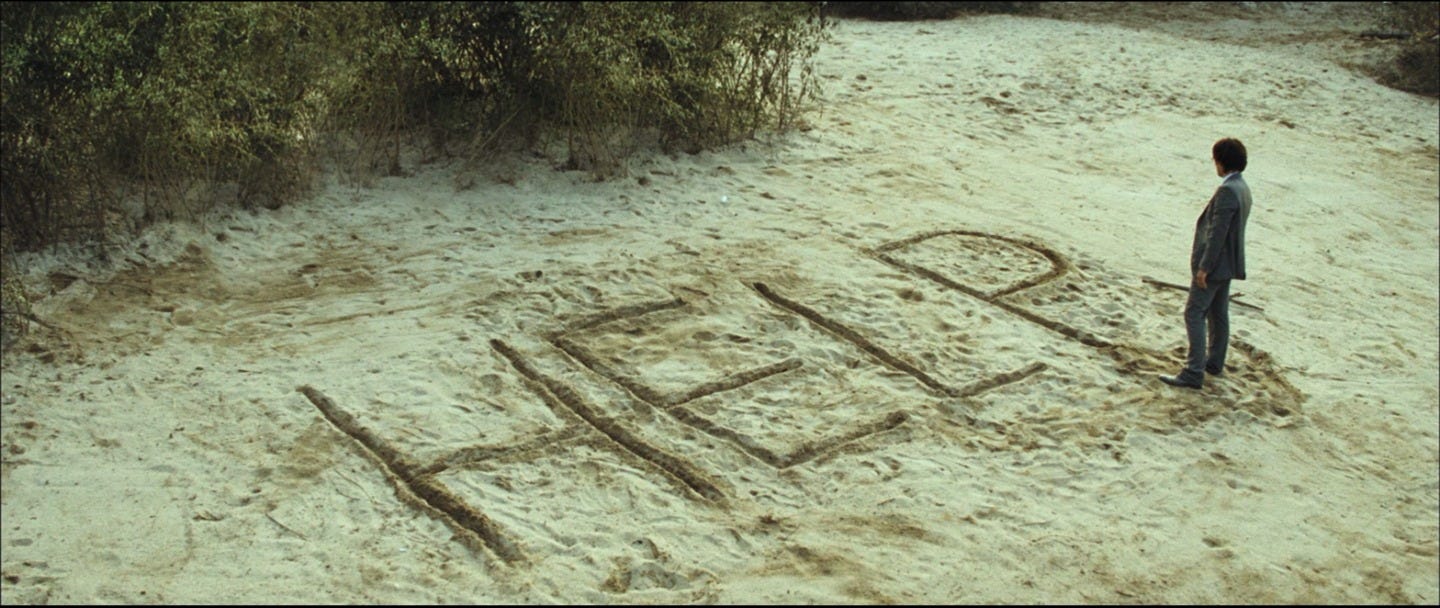Spoilers for Castaway on the Moon (2009). Trigger warnings for discussions of suicide
How many times have we found inspiration when sitting on our thrones? The toilet is the thinking place for excellence.
If there’s one movie where shit is really inspiring, it’s Castaway on the Moon. Though with so much going on, it may not be the first thing you spot in this incredible movie.
Our male protagonist, Kim Seong-guen (Jung Jae-young) is quite desperate when he finds himself still alive (despite attempting suicide) and lost on Bamseom - an uninhabited island in the middle of the Han River that crosses Seoul.
It’s the ultimate irony. He’s all alone, 500m away from 10 million people.

He’s in a state of despair when he understands he cannot get off the island, and close to attempting suicide for a second time, when suddenly he suffers a bout of stomach cramps. He runs to the brush, lowering his trousers to start “laying the egg”.
While he’s there, crouched, he sees a bunch of salvia flowers. They have a beautiful colour and bring memories of him sucking them as a kid. He grabs one flower after another and eats them.
He starts to cry. He says: “Life started to get easier.”
This poop was so fortuitous that Seong-guen not only starts to understand how to survive but starts to thrive.
It smells like catharsis and rebellion. We can see him start to trash his credit cards, collect garbage on the island, forage for food, and try to fish. He gets half naked and bares his ass towards the city, screaming: “Can you see me now?”
His inspirational poop leads to him changing the big ‘HELP’ signal he wrote on the sand into a big ‘HELLO’.

This is the same ‘HELLO’ that attracts the camera lens of Kim Jung-yeon (Jung Reo-won), a hikikomori who has not left her home in three years.
This movie is all about waste: shit and garbage.
The island is full of garbage carried by the current of the river which he uses to create small comforts.
She lives surrounded by garbage accumulated in the three years since she last left her bedroom. It’s comforting to her. It’s familiar. It’s a structure she can rely on.
He sleeps on the wreck of a pedal boat; she sleeps in a bubble wrap lair.
Poop is vitally important again when Seong-guen starts growing his own corn, hoping to one day be able to cook his own noodles.
Where did you get corn seeds on a desert island? In the bird shit that has accumulated on the roof of the wreck.
And how do you fertilise crops? With poop. So, there he is again, crouched, producing fertiliser for his little field. He admits that he will need a lot of poop.
The girl reaches out to him, in a way. They start communicating and connecting. He’s happy on the island now.
Then he is found and told to leave the island. She follows the situation through her camera and decides to go outside to find him. After three long years, she leaves her bedroom. She’s free too now.
When they meet, they almost don’t have to talk. And none of this would have been possible if a suicidal Seong-geun hadn’t had diarrhoea.
Poop is life. It completes and starts the circle of life.
Poop has the power to make you free, from society, from bankruptcy, from your mean ex-girlfriend, from panic attacks, from social anxiety. From everything.
This is why the toilet is the most inspirational place. Because you’re free there.
Director & Writer: Lee Hae-jun
Starring: Jung Jae-young, Jung Reo-won
.








